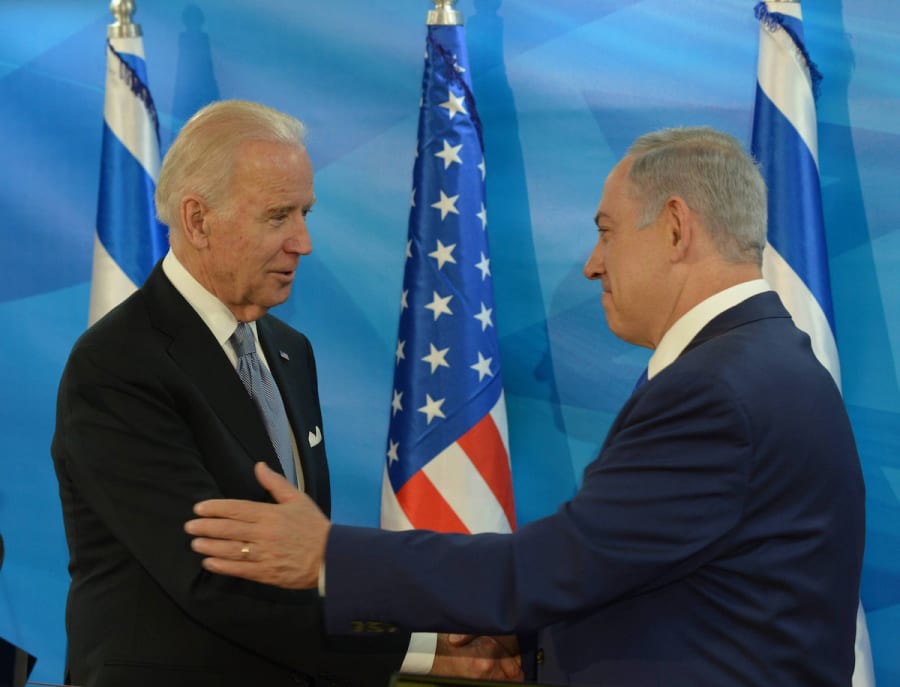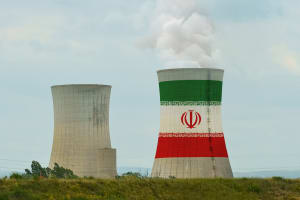Netanyahu’s 40-year friendship with Biden key to forging Israeli-Saudi peace treaty, says former White House advisor who just met with Saudi crown prince
Relationship between Biden, Congress and MBS is so strained, Bibi needs to become a ‘marriage counselor”

JERUSALEM—One of Israeli Prime Minister Benjamin “Bibi” Netanyahu’s top foreign policy objectives is forging an historic and dramatic peace and normalization treaty with the Kingdom of Saudi Arabia.
In nearly interview he has done over the last several months of his book tour for “Bibi: My Story,” Netanyahu discusses this, sometimes at length.
Many pundits and political analysts think Bibi is blowing smoke.
They point to repeated statements by senior Saudi officials since the Abraham Accords were signed in the fall of 2020 that they will only “normalize” relations with Israel after Israel signs a peace treaty with the Palestinians.
But such experts may be wrong.
In my column yesterday, I described my exclusive interview with John Hannah, a senior fellow at the Jewish Institute of National Security of America (JINSA) and former national security advisor to former U.S. Vice President Dick Cheney.
Last November, Hannah led a delegation of top former U.S. military generals – including a former CENTCOM commander – to Riyadh.
They met with Saudi Crown Prince Mohammed bin Salman (MBS) and most of the kingdom’s top political and military leaders.
And they came away with the clear understanding that the Saudis are now ready to make peace with Israel without waiting for the Palestinians.
The only obstacle – yet an enormous one – is the kingdom’s deeply strained relationship with U.S. President Biden and with Congress.
Hannah has come to the conclusion that it is no longer president who would need to help broker a normalization deal between the Israelis and Saudis.
Rather, it is Netanyahu who needs to broker a normalization deal between Washington and Riyadh.
The Saudis want, he says, a robust, vibrant, and trustworthy alliance with the U.S.
They also want written security guarantees from the Americans.
The image that emerged for me was that of a broken marriage and the need for Bibi to emerge as a “marriage counselor” of sorts.
Between Biden and MBS.
And between Congress and MBS.
Can Netanyahu rise to the occasion?
Can he help both sides see how much they need each other and how much the U.S., Saudi Arabia, Israel, and the region, can benefit by a healed and healthier relationship?
Hannah believes the answer is yes.
I lean that way, as well.
Netanyahu has a 40-plus year friendship with Biden.
And deep trust with members of Congress in both major parties.
If anyone can put this marriage on a better, it just might be the “Comeback Kid.”
Here is an excerpt from my conversation with John Hannah, lightly edited for clarity.
ROSENGERG: President Biden has been horrible in terms of his statements about Saudi Arabia and its leadership. He has directly called the crown prince – who is the de facto leader now, with the king being as ill and infirm as he is – and we pray for him and that he is doing well, but he doesn't seem to be doing so well; he [the king] has clearly given the reigns of the kingdom almost exclusively, almost entirely to his son, Mohammed bin Salman, “MBS.” President Biden has called MBS a murderer. And he’s released a four or five-page document from several years ago, which, as I described in my book, “Enemies and Allies” – you read through that document – there is no evidence.
If there is evidence, let's see it, because if he's a murderer, we have to deal with that. But if it's, “Well, he's probably a murderer because that's just the way the system works [in Saudi Arabia,” well, wouldn't be that be the equivalent of saying, “Well, the Iraqis probably have chemical weapons and because they had them before.” Or, “President Trump has probably been colluding with the Russians because we just think, ‘How else could he have won [the presidency in 2016]?” But both a war and a huge investigation of Trump proved those weren't really true. It's not that, by the way, Saddam didn't have any weapons [of mass destruction] or systems [to create such weapons], but it wasn't what we thought. So, circumstantial evidence isn't enough to throw an American ally – a critical ally in a critical region – under the bus.
Biden has also, of course, repeatedly called MBS a “pariah” – part of a “pariah state.” This is bad. Now, he did go, however, to Saudi Arabia last summer.
Tell me, what did you hear? Didn't that make things better? Maybe it did. Maybe, incrementally, it did. I'm not reading that it made things better. The Saudis don't seem to be acting like it made things better. And my read – but I haven't been there in several years now – my read is that [the Saudis didn’t like Biden essentially saying before his trip to the Kingdom, “Like, I will come to your house, but I'm not sure if I'm going to meet with you [MBS]. I might see him, I might see MBS, but I don't know. He might be in the room.” All of that is a level of disrespect and in a shame honor society. Just arriving on Air Force One isn't enough [to improve the relationship.]
JOHN HANNAH: I agree with you entirely, Joel, and that was certainly the vibe we got that they appreciated that the President had reversed course enough that he decided to come to Riyadh, even if…..
ROSENBERG: Right, that’s not insignificant and I have to give him credit for that. But he did it so ham-fistedly.
HANNAH: Right. It was not insignificant. I agree that it was a good first step, I think, in Saudi eyes. But it was quickly overwhelmed by the brouhaha that immediately erupted publicly over the OPEC-plus decision in early October to cut production by 2 million barrels a day, really in defiance of a request from the Biden administration, which was essentially, “Can't you postpone this decision for a month until our midterm elections are finished? Otherwise, the decision itself will be heavily politicized.”
From the Saudi perspective they thought, A) they had very good economic reasons in terms of the future of the energy market to make that cut. Then they feel that the subsequent decline in the price of oil, which we were already seeing when we visited in November, actually confirmed that they were right about the economic consequences of that cut and the Biden administration was wrong.
But the immediate reflex of President Biden after that decision, after that economic disagreement, was to immediately, publicly say, “We're going to impose consequences on Saudi Arabia. We're going to reevaluate and review the bilateral strategic partnership with Saudi Arabia.” We got a sense from the Saudis – the [key] word, “humiliation” – that they were humiliated in front of their own people by this kind of public rebuke by their most important strategic partner that they've really invested all of their security marbles in. They depend so heavily on the United States. But, more importantly, they said, “It sent a signal to the Iranians. It made our neighborhood that much more dangerous to have our worst enemy see that our most important strategic partner and security guarantor, the United States, does not have our back and will not support us.” So, it actually increased the sense of threat that the Saudis feel from the Iranians. So, in lots of ways, I think the OPEC decision kind of did away with whatever marginal good the visit in July did for the President and kind of put us back at square one, unfortunately.
ROSENBERG: It seems like what we've got is a very troubled marriage.
Biden's decision to go [to Saudi Arabia last summer] means he realizes how important Saudi Arabia really is. You can't just cut the legs out from a key American ally, even when you have big disagreements and challenges.
I think that the Biden administration doesn't see how humiliated MBS and his team are by being called “murderers” and “pariahs.” I'm not here to litigate the Jamal Khashoggi situation. But in the absence of the Biden administration giving actual proof that MBS knew and ordered this [murder], which are the key elements, he has arrested everybody involved and sentenced them. If Biden knows more, he has to tell us. If he doesn't, then he has to let that [arrest and sentencing of those directly involved in the murder of Khashoggi] be the correction and realize that his language is harsher than it is, let's say, towards Recep Erdogan, the Turkish president, who has thrown 200,000 people into prison, thrown more journalists into prison than any other NATO country in history, combined.
The way he's treating Saudi Arabia is so much different than he treats other allies. So, MBS being humiliated then reacts and says, “I'm not going to help you in your midterm elections, if that's what you're asking me to do. No.” And then Biden feels humiliated.
The question now I have for you is.
Re-enter Benjamin Netanyahu – is he the marriage counselor that on behalf of the Saudis goes to President Biden, whom he's known for 40 some years;?
They have a bumpy relationship, but it's warm – what's the famous Biden line that Biden scrawled on a photo, “I love you, Bibi, even though I don't agree with a darn thing you've said”? (and he didn't say darn but we are an Evangelical news site.)
So, does Netanyahu have the clout to come in and say, “Listen. Let's all take a deep breath. President Biden, you know that you need the Saudis. We've got to figure out a way.” But there's a huge moment, a Nobel Peace Prize, I would say, even though Trump deserved one and Netanyahu deserve one for the last four agreements, but there really seems, you know, is it possible that Netanyahu could thread this needle [and bring Biden and the Saudis and Israel together]? Because what I'm hearing is not something that can't be fixed. I guess the question is: Does Biden want to fix it, or does it have to wait for another American president, which, who knows what happens over the next two years in the region?
HANNAH: Yeah. I agree entirely, Joel. You know, I spent a lot of time in the U.S. government. So, I like to think that that no American president is beyond reason. The President [Biden] openly claims to be a Zionist. I think there's no reason to doubt his strong feelings about the importance of the U.S.-Israel relationship. He does have a long-standing relationship with Prime Minister Netanyahu, one that Prime Minister Netanyahu obviously didn't have with somebody like President Obama. It is a much, much different relationship. I think Netanyahu can really get a fair hearing, at least, with Biden. And I think, at the margins, if he comes in with a united Israel behind him on the importance of making peace with Saudi Arabia – everybody in Israel, whatever else they all disagree on, I think agree that it would be a huge boon to have peace with the Islamic world's most influential country.
So, I think if Netanyahu is able to come in and make that case to President Biden that, “A peace with Saudi Arabia is in fact absolutely vital for Israel's well-being and security in this region, and we cannot do it without a major assist from the United States, despite all of America's bilateral issues with MBS, whatever they might be. We really need you to come in and help us in making this peace with Israel, with Saudi Arabia, the same kind of role you played in Camp David with Egypt, in the role you played with Jordan, and the role that President Trump played with the four accords of the Abraham Accords.”
And I think Prime Minister Netanyahu will get a hearing for that. And we all know that whatever controversies may still exist about his appearance in Congress in 2015 to talk against the Iran nuclear deal and whatever bruised feelings there may be amongst certain elements of the Democratic Party, he is a man with real stature, real credibility, real knowledge and experience on these issues.
And again, at the margins, I think he can make a big difference and I think he can make a difference in giving President Biden some cover on Capitol Hill, as well. I think there probably are influential members of the Senate and the House of Representatives that if they hear the case from Israeli diplomats and statesmen across the board and most importantly, Prime Minister Netanyahu, about the importance of getting the Saudi relationship right, I think, you know – we keep our fingers crossed; I don't think anything is you know, is in the bank – but I think the stars could be aligned to have real influence on the Biden administration in a very positive way on this issue, provided we don't get distracted by other things in the U.S.-Israel relationship regarding the Palestinian question or other issues that unrelated to Saudi Arabia and Iran and national security issues.

Joel C. Rosenberg is the editor-in-chief of ALL ISRAEL NEWS and ALL ARAB NEWS and the President and CEO of Near East Media. A New York Times best-selling author, Middle East analyst, and Evangelical leader, he lives in Jerusalem with his wife and sons.














